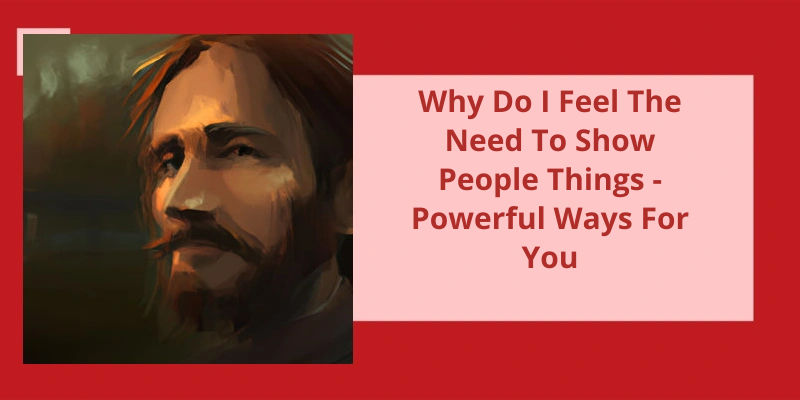In today's increasingly interconnected and visually-driven world, it isn’t uncommon to feel a deep-rooted need to show people things. This urge stems from a variety of factors, including a desire for validation, a need to be heard and understood, and a natural instinct to share experiences and knowledge. Whether it’s showcasing personal achievements, sharing interesting discoveries, or simply seeking connection and feedback, the act of showing things to others has become a powerful way for individuals to express themselves and establish meaningful connections. This innate need to showcase and share is deeply ingrained in human nature, as it allows us to form bonds, create a sense of belonging, and ultimately shape our identities. However, it’s crucial to understand the underlying motivations behind this need and harness it’s power responsibly, ensuring that our intentions align with genuine connection and growth rather than seeking validation or approval. By exploring the reasons behind this urge and adopting mindful strategies, we can navigate the digital age with purpose and authenticity, forging deeper connections and finding true fulfillment in sharing our experiences with others.
What Makes a Person Feel Powerful?
Feeling powerful is a deeply personal experience that comes from within. It isn’t about how others perceive you or your external accomplishments. True power stems from connecting with your strengths and capabilities and having the confidence to trust them. It’s about recognizing and embracing your unique qualities and understanding that they’re enough to see you through any situation.
Personal power is the foundation for a fulfilling and successful life. When you feel powerful, you radiate confidence and attract opportunities. It allows you to fully express yourself and stand up for what you believe in. It gives you the courage to take risks and embrace challenges, knowing that you’ve the ability to overcome them.
One reason why people feel the need to show others their accomplishments or possessions is because they believe it will validate their worth and grant them a sense of power. However, this external validation is fleeting and can never truly fulfill the deep need for personal power. It’s important to remember that true power comes from within and can’t be measured or influenced by external factors.
To cultivate a sense of personal power, it’s essential to focus on self-awareness and self-acceptance. Acknowledge your strengths and celebrate your accomplishments, no matter how small they may seem. Surround yourself with supportive and uplifting people who believe in your abilities and encourage your personal growth.
Embrace opportunities for growth and learning, for they’re the building blocks of personal power. Take time to reflect on your past achievements and use them as a reminder of your capabilities. Remember, true power lies within you, waiting to be unleashed. Trust in yourself and your abilities, and let your personal power guide you towards a life of fulfillment and success.
The fear of rejection or judgment often hinders us from assertively speaking our truths or expressing our emotions. Instead, we allow others to hold sway over us, giving away our power in the process. This unsettling pattern arises when we buy into the notion that we lack the capacity to cope with potential negative consequences, echoing the concerns voiced by well-intentioned friends and acquaintances. However, understanding the reasons behind this self-imposed disempowerment is essential in reclaiming our voice and autonomy.
Why Do I Give People Power Over Me?
Have you ever wondered why you feel the need to show people things? It’s a natural human desire to want to be heard and understood. We all have important thoughts, feelings, and experiences that we want to share with others. However, sometimes we hesitate because we fear the potential consequences. We worry that if we open ourselves up and express ourselves authentically, we might face rejection, judgment, or criticism.
This fear of negative outcomes often leads us to give away our power. We allow the opinions and reactions of others to hold more weight than our own thoughts and feelings. We allow their potential disapproval to dictate our choices and actions. It’s as if we hand over the control of our own lives to others, letting them decide what we can or can’t express.
A common reason for this surrendering of power is the advice of well-meaning friends and family who warn us about the potential negative consequences. They may tell us that we won’t be able to handle the criticism or rejection that may come our way. While their concern may be genuine, we must remember that we’re the ones who know ourselves best. We’re the ones who understand our own strength and resilience.
By listening to these warnings and allowing them to deter us, we’re giving away our power. We’re allowing our fear of what others might think or say to control us. But the truth is, no one knows our capabilities and inner strength better than we do. We’re capable of handling whatever comes our way, even if it includes disappointment or disapproval.
It’s important to recognize that reclaiming our power is a personal journey. It requires a conscious decision to prioritize our own thoughts and feelings over the potential reactions of others. It means acknowledging that our opinions and expression matter, regardless of how they’re received by others. This doesn’t mean we’ve to disregard the input of others entirely, but we need to remember that we’re the ultimate authority on our own lives.
So the next time you feel the need to show people things, remember that your voice matters. Don’t let the fear of negative outcomes or the well-intentioned advice of others hold you back. Embrace your power, speak your truth, and trust in your ability to navigate whatever comes your way. You’re stronger than you realize, and your voice deserves to be heard.
Addressing the Idea of Self-Worth and How It Affects the Way We Give Others Power Over Us
Our need to show people things can stem from a desire to seek validation and prove our self-worth. When we give others the power to validate us through their approval or disapproval, we’re essentially handing over control of our self-esteem. This need for external validation can be influenced by various factors, such as societal pressures, comparison to others, or past experiences. By recognizing our own self-worth and building a strong sense of self-esteem, we can lessen the need to seek validation from others and regain control over our own happiness and contentment.
It’s liberating to embrace your personal power, where you prioritize your own thoughts, feelings, wishes, and needs without constantly seeking validation or fearing judgment from others. True empowerment lies in making decisions that align with your authentic self and relinquishing dependence on others’ opinions or discomforts. By embracing this mindset, you can unlock a sense of confidence, autonomy, and inner strength.
How Do You Feel Sense of Power?
Your personal power emerges when you present your own thoughts, feelings, wishes, needs, and youre not always worried about what others say or their judgments. It’s a sense of empowerment that comes from within, where you trust your own judgment and have confidence in your own abilities. When you’re able to assert yourself and stand up for what you believe in, you feel a sense of power.
Showing people things can also be a way to assert your knowledge, expertise, and accomplishments. It’s natural to want to share your achievements and successes with others, as a way to validate your worth and garner recognition. By showing people what you’ve done or achieved, you aren’t only highlighting your skills and talents but also seeking acknowledgment and validation of your abilities. This can be a powerful way to boost your self-confidence and reinforce your sense of personal power.
Moreover, sharing things with others can also be a way to inspire and motivate them. Through sharing your experiences, knowledge, and insights, you’ve the opportunity to impact and influence others in a positive way. By showing people things, you’re inviting them to learn from your experiences, benefit from your wisdom, and ultimately grow and develop themselves. This act of sharing can create a sense of connection and fulfillment, enriching both your own life and the lives of those you engage with.
Finally, showing people things can serve as a way to build relationships and establish connections. It’s through sharing our thoughts, opinions, and experiences that we become relatable and accessible to others. By opening ourselves up and demonstrating vulnerability, we invite others to do the same, fostering deeper connections and meaningful relationships. Through this exchange, we not only empower ourselves but also create an environment of mutual support, understanding, and growth.
Feeling the need to show people things can stem from a desire to assert our personal power, seek validation, inspire others, and build connections. It’s through this act of sharing that we can truly embrace our individuality, make a positive impact, and create a sense of fulfillment in our own lives and the lives of others. So go ahead and show the world what youve got – your personal power awaits!
The Importance of Validation and Recognition in Building Personal Power
- The importance of validation in building personal power
- The power of recognition in personal development
- How validation and recognition contribute to self-esteem
- Why validation and recognition are crucial for personal growth
- The role of validation and recognition in building confidence
- Strategies for seeking validation and recognition in a healthy way
- The impact of validation and recognition on mental well-being
- How validation and recognition can foster resilience
- Recognizing and validating the achievements of others
- Building personal power through self-validation and self-recognition
Source: What gives people the feeling of power?..
There are many ways to tap into and embrace a sense of personal power that can greatly benefit your mental wellbeing. One effective strategy is journaling, a practice that allows you to explore your thoughts and emotions, gaining clarity and empowering self-reflection. Another powerful tool is meditation, which helps you cultivate a sense of control over your emotions and realize your own self-worth. Additionally, practicing gratitude and engaging in creative activities can further enhance your sense of personal power. Finally, incorporating physical activity into your routine can have a profound impact on how you feel, boosting both your physical and mental strength.
What Can Make a Person Feel Powerful?
What can make a person feel powerful? There are many factors that contribute to this feeling, and it’s important to understand that power comes from within. Here are some strategies to embrace feeling powerful that are great for your mental wellbeing!
One powerful way to feel in control and empowered is by keeping a journal. Writing down your thoughts and emotions can help you process and understand them better, giving you a sense of clarity and control over your own life. By jotting down your goals, dreams, and aspirations, you can visualize and manifest them into reality.
Another way to tap into your inner power is through practicing meditation. Taking the time to sit in silence, focus on your breath, and clear your mind can help you let go of stress and negative thoughts. Meditation can also enhance self-awareness and self-acceptance, reminding you of your own worth and strength.
Expressing gratitude is another powerful way to feel empowered. By acknowledging and appreciating the positive aspects of your life, you shift your focus from what’s lacking to what you already have. This practice can cultivate a sense of abundance and contentment, making you feel more powerful and in control of your own happiness.
Engaging in something creative can also boost your sense of power. Whether it’s painting, writing, dancing, or playing an instrument, expressing yourself creatively can be liberating and empowering. Creativity allows you to tap into your unique gifts and talents, reminding you of your own abilities and potential.
Lastly, moving your body is a great way to tap into your power. Exercise releases endorphins, which are natural feel-good chemicals in the brain. It can boost your mood, increase confidence, and improve your overall sense of wellbeing. Moving your body also allows you to connect with yourself on a physical level, reminding you of your own strength and resilience.
By journaling, meditating, practicing gratitude, engaging in something creative, and moving your body, you can tap into your own power and experience a greater sense of mental wellbeing. Remember, power comes from within, and when you harness it, theres no limit to what you can achieve.
Developing Strong and Healthy Relationships: Surrounding Yourself With Supportive and Positive People Can Make You Feel Empowered and Confident.
- Surround yourself with supportive and positive individuals.
- Build strong and healthy relationships.
- Interact with people who empower and boost your confidence.
- Surrounding yourself with the right support system is important.
- Developing meaningful connections can lead to empowerment.
- Positive relationships contribute to your overall well-being.
- Seek out individuals who uplift and inspire you.
- Building a strong support network enhances personal growth.
- Surrounding yourself with the right people cultivates positivity.
- Nurturing healthy relationships improves your self-esteem.
There are various reasons why people are drawn to the idea of having power over others. For some, the desire stems from a need for control, while for others, it comes from a longing to exert influence over their own lives. However, motivations can also be rooted in fear or mistrust, leading individuals to resort to coercive and antisocial strategies in order to establish dominance.
Why Do People Like to Have Power Over You?
So, why do people like to have power over you? There are several reasons why individuals may seek power over others. One major motivation is the desire to have control. By having power over someone, they’re able to dictate their actions, manipulate their decisions, and ultimately have a sense of authority. This control can give individuals a sense of superiority and dominance, boosting their self-esteem and ego.
Interestingly, fear and mistrust can also play a role in why people seek power over you. Some individuals may have an inherent fear of being controlled themselves, leading them to employ coercive and antisocial strategies to gain power over others. They believe that by having control, they can protect themselves from being manipulated or taken advantage of. This fear-driven motivation can result in harmful power dynamics and toxic relationships.
In our competitive world, power is often equated with success and influence. This can create a strong drive to climb the social ladder, acquire more resources, and assert dominance over others. The pressure to conform to societal norms and expectations can further fuel the desire for power, as individuals strive to be recognized and respected.
Being a powerful person entails having the ability to control or influence individuals and situations. A powerful individual or organization holds the potential to sway people’s opinions or shape the course of events. They possess a level of importance and authority that garners attention and compels others to heed their words. Examples of powerful entities can include nations such as Russia and India, who possess substantial control and influence due to their size and stature. Synonyms for powerful include influential, dominant, controlling, and commanding.
What Does It Mean to Be a Powerful Person?
Being a powerful person goes beyond mere physical strength or wealth. It means having the ability to control or influence people and events. A powerful person is someone who possesses the qualities necessary to command attention and make an impact on others. They’re influential figures who’ve the ability to shape opinions, inspire action, and bring about meaningful change.
Powerful individuals often have a strong presence that demands respect and commands attention. They’re capable of captivating audiences with their words and actions, making others listen and take notice of what they’ve to say. These individuals possess exceptional communication skills, allowing them to convey their ideas and beliefs effectively to build trust and loyalty among their followers.
Moreover, powerful people are often dominant in their respective fields. They’ve achieved a level of expertise and success that sets them apart from others. Whether it’s through their extensive knowledge, skillset, or professional achievements, they’ve gained the respect and admiration of their peers. This dominance gives them the ability to influence and shape the course of events and decisions.
They possess a high level of emotional intelligence, enabling them to stay composed and rational in challenging situations. This self-control allows them to navigate through obstacles and setbacks, ultimately achieving their goals with determination and resilience.
In addition, powerful organizations are those that hold significant influence and control within their respective industries. They’ve established themselves as leaders, setting the standards and trends that others follow. Whether it’s through their market share, customer base, or financial resources, these organizations have the ability to shape the behaviors and actions of their competitors and clients.
It requires a combination of qualities such as strong communication skills, dominance in ones field, emotional intelligence, and the ability to exercise control and resilience. Powerful individuals and organizations have the capability to make a lasting impact, shape opinions, and drive meaningful change in their surroundings.
Conclusion
In a constantly interconnected world, where social media platforms allow us to share our lives with others at the touch of a button, it’s no wonder that many of us feel the need to exhibit our experiences and possessions to the world. This urge to show people things is deeply rooted in our human nature, driven by a variety of factors such as validation, societal expectations, and a desire for connection. By understanding the underlying reasons behind this inclination, we can navigate the digital landscape more mindfully and use powerful methods to fulfill our need for self-expression while maintaining a healthy balance. Rather than solely seeking external approval, we can focus on genuinely connecting with others and fostering authentic relationships. Additionally, we can channel our need to display into creative outlets or hobbies that provide a sense of accomplishment and fulfillment. Ultimately, it’s crucial to recognize that the need to show people things isn’t inherently negative, but it’s essential to approach it consciously and strive for a healthy motivation, genuine connections, and self-fulfillment.






